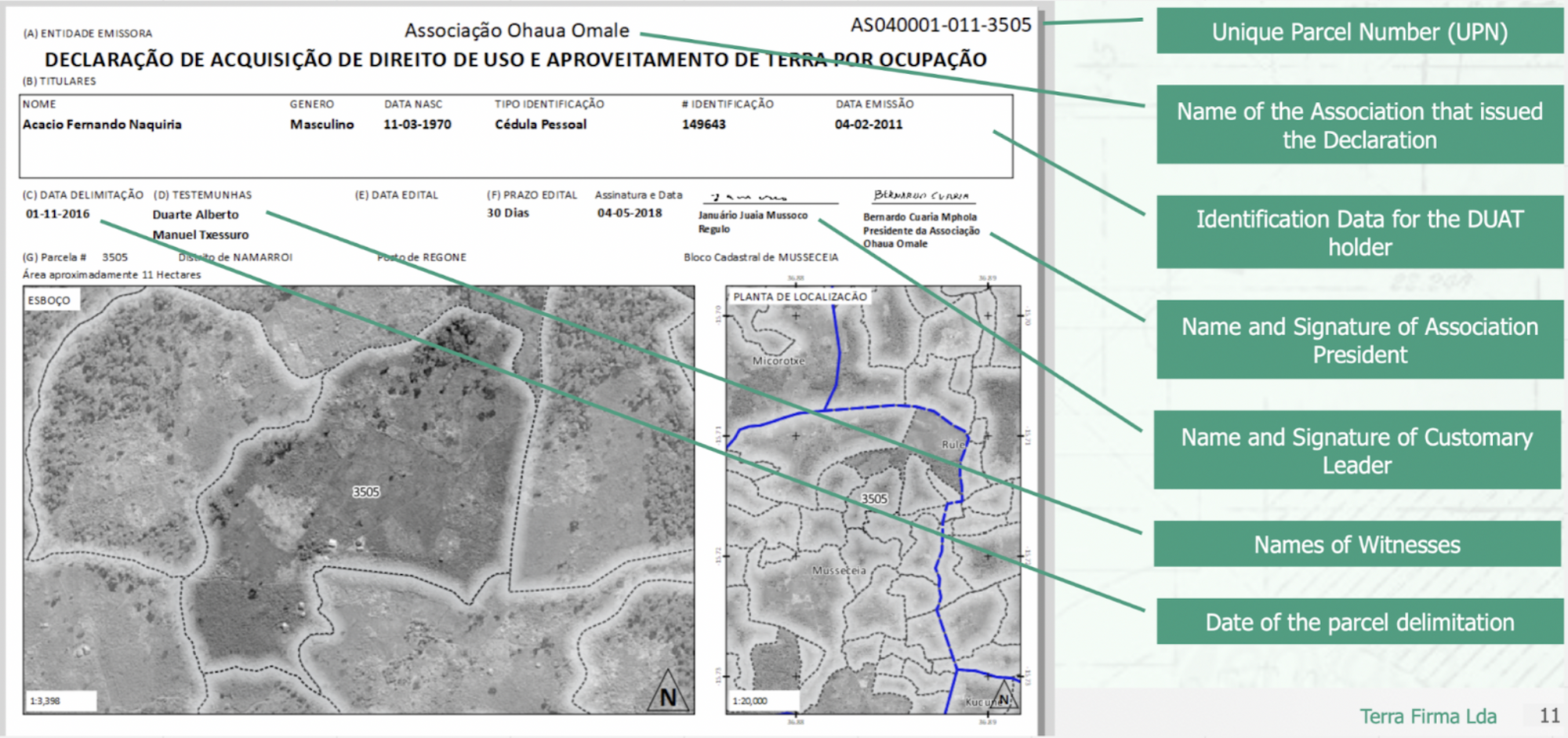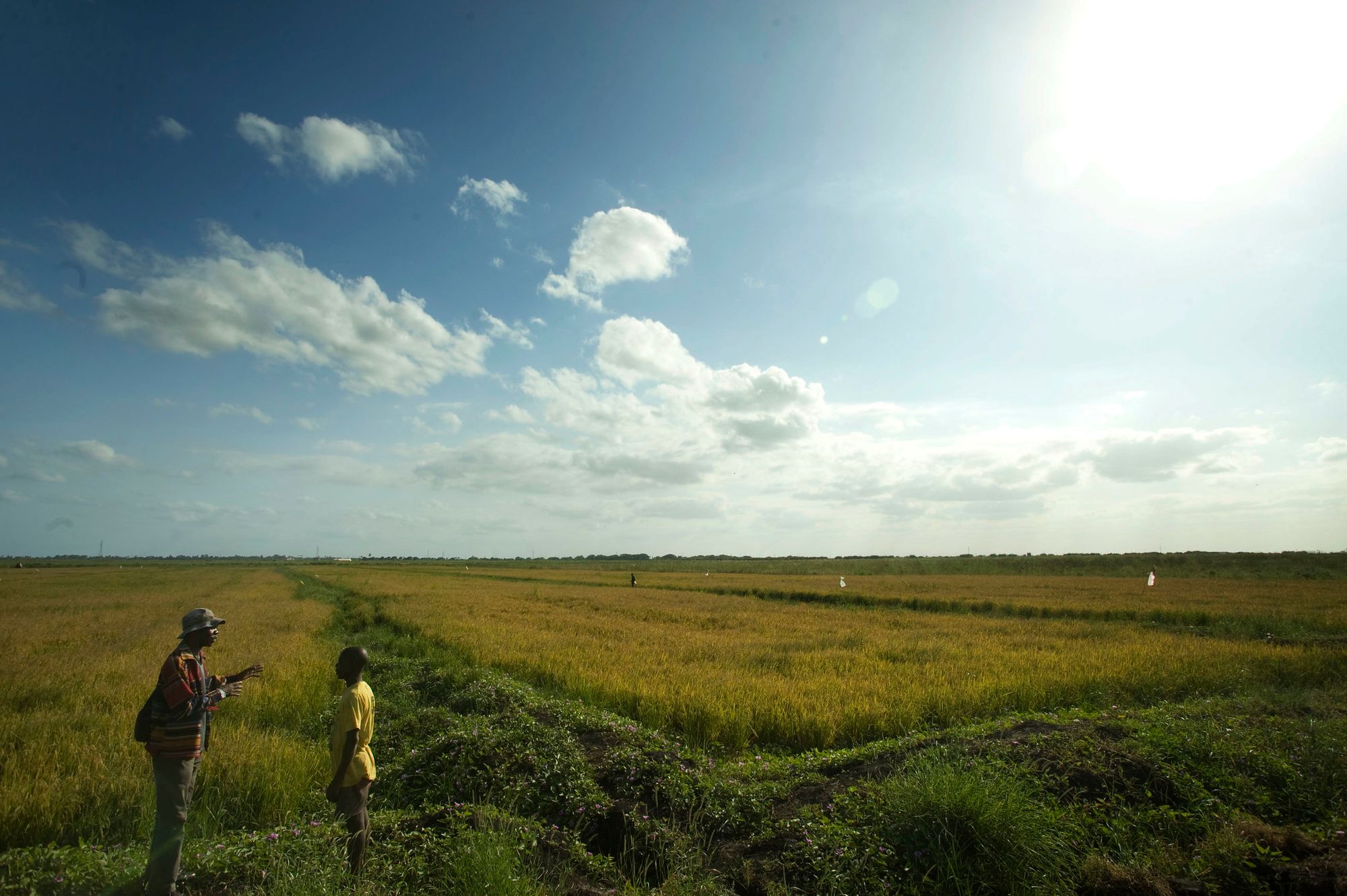Mozambique & the CaVaTeCo System
If communities mapped their own territories, would land disputes decrease? Does land tenure security improve economic opportunities within marginalized societies? How do trustworthy, reliable land right records empower people?
These key research questions are being answered through the pioneering work done by a Landano partner in Mozambique.
Terra Firma is a land-based consultant group based in Mozambique that has developed the Community Land Value Chain (CaVaTeCo) system to equip communities with the ability to map and document ownership of land and natural resources (Landano, 2022).
The CaVaTeCo approach utilizes inexpensive tools, like handheld GPS devices and open-source GIS software to encourage community members to engage with the mapping of their traditional lands (Terra Firma, 2018).
This innovative project uses a bottom-up approach to land governance and property rights for individuals living in rural areas. This makes it a perfect match for Landano’s own methodology and tools which are now being integrated to add blockchain notarization and DeFi access to CaVaTeCo.
Terra Firma has developed CaVaTeCo to take advantage of the unique regulatory environment in Mozambique. There have been an array of major policy decisions that have shaped land administration in this country, including the 1990 Constitution, the National Land Policy of 1995, the Land law of 1997, the Rural Land law of 1998, and more (Norfolk, 2020). Accordingly, land in Mozambique can be divided into two major categories: public lands which are maintained by the government, and community lands maintained by rural communities.
The Land law of 1997 enables community-declared right declarations (DUATs). These allow members of local communities to obtain individual plots of land within community lands with the approval of local leaders (USAID, 2018). The CaVaTeCo system has formalized and provided structure to these DUAT declarations.
To connect these DUATs and the corresponding parcels of land to DeFi opportunities, they will be minted on the Cardano blockchain as non-fungible tokens (NFT) using the Landano platform.

Problems with the current system
Mozambican government agencies and private companies view communities as participants in land management and administration but not as rights-holders (Meij, 2022). This is problematic for individuals seeking to express autonomy over their land and securing opportunities for economic mobility.
The rural population of Mozambique includes over twenty million people, ninety-five percent of whom live and farm on land which remains unmapped and undocumented (Tabary, 2018). This creates inherent challenges to proper allocation of land, documentation of land transfers, and equitable distribution of natural resources. Often, individuals living in these areas are unable to access the national land administration system due to the remoteness and cost of travel to government land offices, unaffordable fees for various agents and processes, and a range of bureaucratic and I.C.T. shortcomings.

Currently, for most villages throughout Mozambique, land and farms are passed down through family or via informal agreements of land transfers, which are rarely documented (World Bank, 2014). These informal agreements around land management and administration can lead to violence if there is a dispute.
Individuals living throughout Mozambique recognize the need for formalized documentation of land. During a 2017 World Bank mapping project in the small town of Meitor, one resident noted, “documentation has planted seeds of trust in the community. And with that trust comes opportunities for cooperation.” (Pimentel, 2020)
This lack of documentation excludes rural populations from leveraging their land rights to improve their economic and social security. Tenure security informs people’s livelihoods and decision-making, such as whether to make financial investments into land-based businesses like farms and shops. (Tabary, 2020)
In fact, excluding individuals from accessing land rights and tenure security has a multi-generational impact on communities. Land ownership is vital to the development of intergenerational wealth. Documentation of these rights in a trustworthy digital format enables them to build a path out of poverty and access mortgages, lines of credit, and decentralized finance (DeFi) products such as business loans.
The Terra Firma and Landano partnership
As an independent registry of land rights that mints ISO standards compliant records on the Cardano blockchain, Landano has become a key partner to Terra Firma and its mission.
The two teams are now working to import CaVaTeCo land title records and cadastral map data, mint Cardano NFTs of each DUAT record, publish all available mapping data, register new land title records, as well as transfer and verify land ownership rights. We will also make these maps publicly available for access and re-use outside of the Landano platform by local communities and government agencies.
Landano is a solution to the data quality problem in land administration. It provides reliable, open data to support land management in an easy-to-query, mobile-friendly interface supported by maps, permanent archival records, and authenticity proofs that use blockchain notarization (NFTs). Landano is excited and proud to collaborate with the Terra Firma team in Mozambique and to further enhance the significant real world impact their work has already made.
References
Landano. (15 March 2022). A People’s Cadastre in Mozambique [Video]. YouTube.https://youtu.be/DAI0DKfxvE8
Meij, L., and Muianga, M. (15 July 2022). “Seeking inclusive, economical, and technical solutions for a sustainable land administration system in Mozambique.” Land Portal. Retrieved from https://landportal.org/blog-post/land-scale/seeking-inclusive-economical-and-technical-solutions-sustainable-land
Norfolk, S., Quan, J. & D. Mullins (April 2020), “Options for Securing Tenure and Documenting Land Rights in Mozambique: A Land Policy & Practice Paper.” LEGEND, 1-46. http://dx.doi.org/10.13140/RG.2.2.33686.29766
Pimentel, P. (12 November 2020). “In Mozambique, building trust through land rights.” World Bank. Retrieved from https://blogs.worldbank.org/nasikiliza/mozambique-building-trust-through-land-rights
Tabary, Z. (15 November 2018). “Land laws worthless without proof of ownership: experts”. Thomson Reuters Foundation. Retrieved from https://www.reuters.com/article/us-landrights-conference-tech/land-laws-worthless-without-proof-of-ownership-experts-idUSKCN1NK2GZ
Tabary, Z. (15 July 2020). “Nearly one billion people scared of losing homes or land, poll finds”. Thomson Reuters Foundation. https://www.reuters.com/article/global-landrights-housing-idUKL5N2EL2LM
Terra Firma, and ORAM. (May 2018). “CaVaTeCo Briefing Note: Piloting the “Community Land Value Chain” Approach in Mozambique.” Land Portal. Retrieved from https://www.landportal.org/library/resources/cavateco-briefing-note-piloting-%E2%80%9Ccommunity-land-value-chain%E2%80%9D-approach-mozambique
World Bank. (31 March 2014). “Land and Food Security”. World Bank. Retrieved from https://www.worldbank.org/en/topic/agriculture/brief/land-and-food-security1

